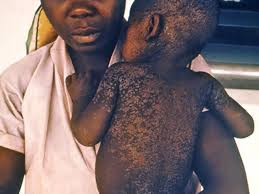Highest numbers of measles outbreak was recorded in Cross River State
and particularly in Bakassi Local Government Area of the state in 2013
and 980 teams made of seven members each to handle the 2016 Immunization
Campaign Exercise in the state. This was disclosed by the World Health
Organization (WHO) Integrated Measles Campaign (IMC) consultant, Mrs
Sherifat Lawal yesterday while briefing newsmen in Calabar.
Mrs Lawal said that Measles was still serious problem in Nigeria and remains one of the leading causes of deaths in children below 5 years. “Nigeria still faces sporadic measles outbreaks despites efforts to reduce the risk of outbreaks through routine immunization and special campaigns conducted in 2008, 2011 and 2013.
“The highest number of cases was recorded in 2013 (over 33, 000). Close to the end of 2014, the country recorded 14, 937 suspected cases in 224 LGAs in 32 States while confirmed cases totalling 4, 392 in 296 LGAs. Most of the children affected were below the age of 5 years (62%) and 65% were zero dose,” she stated.
Most of these missed children according to her were located at border areas with a high proportion of them not vaccinated due to child absent, fixed post location too far and non-compliance. “The World Health Organization (WHO) has ranked Nigeria third, behind India and Pakistan, as one of the three countries that accounts for the majority of global deaths due to measles infection” Measles is the most killer of children than any other preventable disease. Measles start with a fewer which can get very high.
It is followed by cough, running nose, sneezing, red eyes and a breakout of rashes over the face and body within 3 days, starting from the head and spreading to the rest of the body. The rashes can last for a week and coughing can last for 10 days. Common complications arising from measles include diarrhoea, ear infection, brain infection, pneumonia, blindness and even death. Interestingly, Nigeria is conducting a measles campaign to rapidly immune children from ages 9 to 59 months.
Mrs Lawal said that Measles was still serious problem in Nigeria and remains one of the leading causes of deaths in children below 5 years. “Nigeria still faces sporadic measles outbreaks despites efforts to reduce the risk of outbreaks through routine immunization and special campaigns conducted in 2008, 2011 and 2013.
“The highest number of cases was recorded in 2013 (over 33, 000). Close to the end of 2014, the country recorded 14, 937 suspected cases in 224 LGAs in 32 States while confirmed cases totalling 4, 392 in 296 LGAs. Most of the children affected were below the age of 5 years (62%) and 65% were zero dose,” she stated.
Most of these missed children according to her were located at border areas with a high proportion of them not vaccinated due to child absent, fixed post location too far and non-compliance. “The World Health Organization (WHO) has ranked Nigeria third, behind India and Pakistan, as one of the three countries that accounts for the majority of global deaths due to measles infection” Measles is the most killer of children than any other preventable disease. Measles start with a fewer which can get very high.
It is followed by cough, running nose, sneezing, red eyes and a breakout of rashes over the face and body within 3 days, starting from the head and spreading to the rest of the body. The rashes can last for a week and coughing can last for 10 days. Common complications arising from measles include diarrhoea, ear infection, brain infection, pneumonia, blindness and even death. Interestingly, Nigeria is conducting a measles campaign to rapidly immune children from ages 9 to 59 months.

Comments
Post a Comment